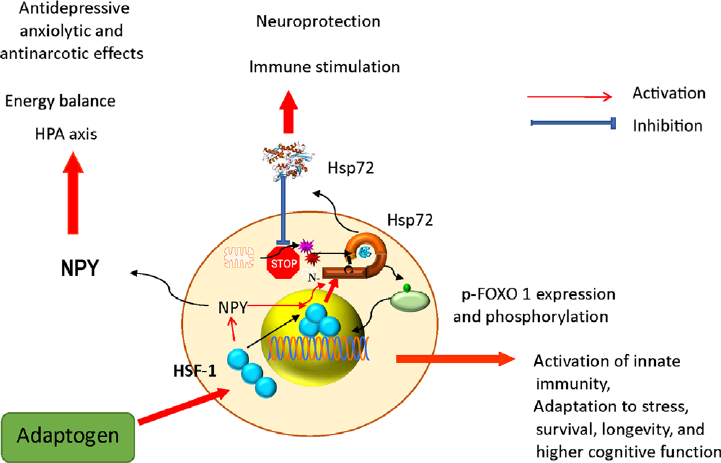
- Clinical insight
- Reading Time: 4 Minutes
Adaptogens: exploring their actions and complexity
Herbal adaptogens are well known for their health benefits in assisting the body to resist and adapt to various stressors; however, their mechanisms of action are not fully understood. At a cellular level they appear to perform highly complex and multifaceted roles.
The actions and complexity of adaptogens
Stress can present in many forms (including psychological, physical, biological, and environmental) and is an unavoidable part of everyday life. While acute stress is usually not harmful, uncontrolled chronic stress that exceeds one’s ability to cope can lead to fatigue and increased risk of illness. Research shows that almost every system in the body can be impacted by chronic stress.1 Herbs are commonly and traditionally used for increasing the body’s ability to cope with stress, in particular the group of herbs classed as adaptogens. Although adaptogens are well known for their health benefits, their exact mechanisms of action are not fully understood but according to hypotheses are highly complex.
Adaptogens explained
Adaptogens are unique herbal substances that help the body to adapt to stress.2 Many herbs with adaptogenic properties have been used in traditional systems of medicine, including traditional Chinese medicine and Ayurveda, but it was not until 1940 that the Russian scientist, Nicolai Lazarev, coined the term ‘adaptogen’ to describe plant-originated substances that have the ability to non-specifically assist the human body in resisting a wide range of stressors.3
Adaptogens work with the body to restore homeostasis and increase non-specific resistance to stressors, leading to increased tolerance to exhaustion, enhanced attention, and mental endurance.4 The active constituents for these actions are typically either complex phenolics or tetracyclic triterpenoids. In ginseng, for example, the active constituents believed to be involved in the protective inactivation of the effects of stressors are the ginsenosides. 5
Overall effects of adaptogens
By increasing the state of non-specific resistance in stress and decreasing the sensitivity to stressors, adaptogens can prolong the resistance phase to stress and increase homoeostatic adaptation to stressors. They can do this by utilising enhanced energetic resources and diminishing the damage caused by stress.5,6
Adaptogens are often termed as stimulants; however, in contrast to conventional stimulants, adaptogens work to restore equilibrium and maintain homeostasis; they do not cause addictions, have abuse potential, or lead to tolerance issues. Additionally, the function of an adaptogen is more pronounced when there is current stress or fatigue. 5
Comparative effects of adaptogens
| Characteristic | Stimulants | Adaptogens | |
| 1. | Recovery process after exhaustive physical load | Low | High |
| 2. | Energy depletion | Yes | No |
| 3. | Performance in stress | – | Increased |
| 4. | Survival in stress | – | Increased |
| 5. | Quality of arousal | Poor | Good |
| 6. | Addiction potential | Yes | No |
| 7. | Side effects | Yes | Rare |
| 8. | DNA/RNA and proteins synthesis | Decreased | Increased |
Table adapted from: Panossian A, et al. Effects of adaptogens on the central nervous system and the molecular mechanisms associated with their stress-protective activity. Pharmaceuticals (Besel) 2010: 3(1):188-224.
Mechanism of action on two levels
Even though the exact mechanisms of action of adaptogens are still to be fully elucidated, they are thought to act at two levels of regulation: organism and cellular.7
On the level of the whole organism, they support homeostasis through the regulation of the hypothalamic-pituitary-adrenal (HPA) axis, involving the stress hormone cortisol and other mediators of the stress response. On the cellular level, they modulate gene expression of key mediators of intracellular communication involved in stress-induced signal transduction pathways, as illustrated in the following diagram.7,8
Proposed mechanism of action at the cellular level

Diagram adapted from: Panossian A. Understanding adaptogenic activity: specificity of the pharmacological action of adaptogens and other phytochemicals. Ann N Y Acad Sci 2017 Aug;1401(1):49-64.
The cellular effect of adaptogens
According to a hypothesis, at the cellular level adaptogens activate expression and release of neuropeptide Y (NPY) and heat shock proteins (including Hsp72) through a heat shock factor (HSF-1) dependent mechanism. NPY plays an important role in the regulation of the HPA axis and energy homeostasis and for Hsp72 secretion, which is crucial for neuroprotection and innate immunity.
Hsp72, in turn, inhibits the FOXO transcription factor, leading to increased adaptation to stress and longevity. Together these pathways contribute to the antifatigue effects of adaptogens, leading to increased attention and improved cognitive function.
Thus, stimulation and release of NPY and Hsp72 increases tolerance and adaptation to stress and may further play important roles in regulation of ageing, and pathogenesis of age-related disorders.
Additionally, through the effects of NPY and Hsp, adaptogens may also suppress a stress induced protein known as c-Jun N-terminal kinase (JKN). Elevated levels of JKN block cortisol feedback loops resulting in permanently high levels of the stress hormone cortisol.7,8
References
- Salleh MR. Life event, stress and illness. Malaysian Journal of Medical Sciences 2008 Oct;15(4):9-18.
- Irfan M, et al. Adaptogenic effects of Panax ginseng on modulation of cardiovascular function. J Ginseng Res. 2020;44(4):538-43
- Liao L-Y, et al. A preliminary review of studies on adaptogens: comparison of their bioactivity in TCM with that of ginseng-like herbs used worldwide. Chin Med. 2018;13:57
- Panossian A, et al. Evidence-based efficacy of adaptogens in fatigue, and molecular mechanisms related to their stress-protective activity. Curr Clin Pharmacol. 2009;4(3):198-219
- Panossian A, et al. Effects of adaptogens on the central nervous system and the molecular mechanisms associated with their stress-protective activity. Pharmaceuticals (Besel). 2010;3(1):188-224
- Bilia AR, et al. The G115 standardized ginseng extract: an example for safety, efficacy, and quality of an herbal medicine. J Ginseng Res. 2020;44:179-193
- Panossian A. Adaptogens in mental and behavioural disorders. Psychiatr Clin North Am. 2013;36(1):49-64
- Panossian A. Understanding adaptogenic activity: specificity of the pharmacological action of adaptogens and other phytochemicals. Ann N Y Acad Sci. 2017;1401(1):49-64



